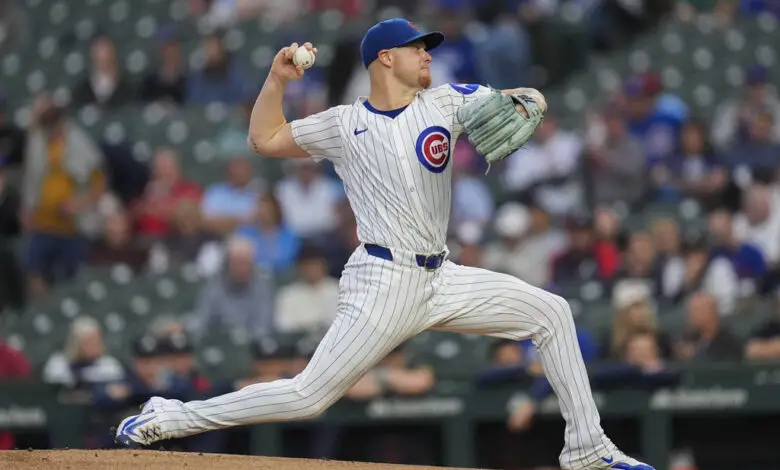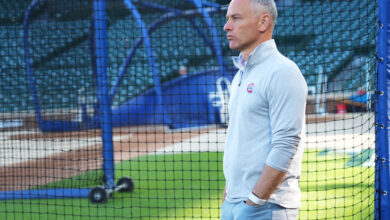
Pulling Cade Horton Early Best for Cubs’ Long-Term Strategy
We all know the baseball season lasts 162 games, yet we can still find ourselves perseverating over the strategy and outcome of a single contest. That was the case Wednesday night, not to mention a number of other contests that have fallen 5-6 days apart stretching back over the last month. Cade Horton was lifted from his start after five innings and 75 pitches, which wouldn’t have been so notable had he not been no-hitting the Braves with six strikeouts and one walk.
The Cubs going on to lose 5-1 in the series finale certainly didn’t help matters, but the team has set a course when it comes to handling Horton’s workload down the stretch. He has only exceeded 75 pitches once in his last seven starts, an 82-pitch effort in Toronto that saw him record two outs in the 6th on 72 throws before a 10-pitch walk to Bo Bichette ended his evening.
“It’s what we’re doing,” Craig Counsell explained to media members following Wednesday’s loss. “That’s how we’re going to move forward with this. That innings number could get pretty high, so we’re going to make sure that he is properly taken care of and that’s not going to change.”
Horton is now up to 103.2 MLB innings, far more than he’s ever thrown at any level of his life. Add in his minor-league work earlier in the season and he’s at 132.2 innings, 10 more than in his two previous years combined. While this won’t be like Stephen Strasburg in 2012, a season in which he was shut down in early September and did not pitch in the postseason for the top-seeded Nats in their NLDS loss to the Cardinals, the Cubs are going to remain judicious.
I know that’s not how a team would have played things back in the day, and it may even rankle you enough to have you telling the Cubs to get off your lawn. Thing is, having a playoff berth all but assured means they have to plan for October right now. And when Horton figures to be one of their three postseason starters, everyone in the organization understands the deal. That includes the man at the center of the conversation.
“Jokingly,” Horton said when asked if he fought to stay in the game. “I know at the end of the day, it’s not going to happen, and that’s all right. I feel like I’d much rather be healthy for the postseason than go out there for the 6th or 7th in early September.”
Lest you forget, this is a guy who rose to be the surprise No. 7 overall pick on the strength of his performance for Oklahoma in the 2022 College World Series. Following a college career cut short by injuries, Horton surged at the perfect moment to help his team reach the championship.
Ed note: An earlier version of this story said the Sooners won, which is not the case. They loss to Ole Miss. Derp.
In any case, the point here is that Horton is in uncharted territory when it comes to the number of innings and pitches he’s thrown. There’s no magic number here, but the Cubs’ use of 75 pitches as his limit for now isn’t just guesswork. What people may fail to realize is that the team has ways to monitor Horton’s acute (in-game fatigue) and chronic (long-term arm strength and fitness) workloads to ensure he’s at a proper ratio. Driveline puts an ideal A:C ratio at 0.7 – 1.3, which indicates that those workloads are similar.
The Cubs don’t appear to be having Horton wear a Driveline Pulse monitor during games, but you can bet very good money on them using various methods to track his arm health. Because as good as he’s looked and as much as we’d all love to see him out there carrying the team for 7-8 innings every few days, it’s more important that he’s at full strength come October. So as tantalizing as it is to want to lean more heavily on a dude with a 0.77 ERA and six shutout starts in the second half, discretion is indeed the better part of valor.
As the Chinese general told Frank Lucas in American Gangster, “Quitting while you’re ahead is not the same as quitting.”
Ed. note: Based on some early reactions, I thought it best to remind everyone that leaving Horton in the game would not have guaranteed a no-hitter or even a shutout and a Cubs win. What if he’d been shelled in the 6th inning? The Cubs have been employing the same strategy with Horton for weeks now, and breaking from that just because of the potential for individual accomplishment would be foolish. They’re prioritizing his health and their long-term competitiveness as a team, which is how it should be.
Oh, one more thing: Horton has pitched more than six innings exactly twice as a pro (both with the Cubs in July), and he’s never gone more than seven. The only time in his life — barring a possible extra-innings game in high school or travel ball he’s gone more than seven was for OU in an eventual loss to Ole Miss on June 26, 2022. He’s thrown 90 or more pitches four times with the Cubs, maxing out at 94 on July 9 against the Twins.
Even with five-pitch innings the rest of the way, getting a complete game out of him on Wednesday would have put him at 95 pitches. And if you think he only would have needed 20 more throws, well…

